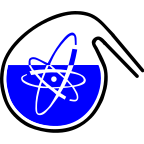Speaker
Description
Radon-222 is a radioactive noble gas omnipresent in the environment. Being part of the U-238/Ra-226 decay chain, it has been found to considerably contribute to the radiation dose to the public. Exposure to Rn-222 at home and workplace has been extensively monitored and specific guidelines exist to mitigate exposure. Rn-222 has also gained considerable attention in particle physics research, where it is considered as unwanted contaminant in low-background environments. There has been extensive research on Rn removal since the discovery of its adsorption on activated charcoal by Rutherford in 1906 and numerous scientific publications exist on the adsorption of Rn-222 on carbon and on other materials. However, there is little development in the field of radon capture at room temperature and cryogenically cooled charcoal remains the material of choice as of today.
We report here on the remarkable property of silver exchanged zeolites to efficiently adsorb radon at room temperature. We have investigated three commercially available zeolite materials and compared their adsorption performance to commonly available activated carbons by measuring 222Rn breakthrough curves under different experimental conditions. Depending on the type of carrier gas and gas velocity, dynamic adsorption factors k were found to be at least two orders of magnitude higher for zeolite materials as compared to activated carbons. Moisture control was found to be crucial for effective Rn-222 adsorption since water has shown to exhibit a strong competitive effect.
This contribution will present experimental results obtained from systematic investigations involving the practical usage of these materials. It is shown that more compact and economic room-temperature Rn-222 adsorption systems can be designed using silver exchanged zeolites considerably reducing the impact of Rn-222 originating from Ra-226 emanations in environmental, scientific and industrial applications.

